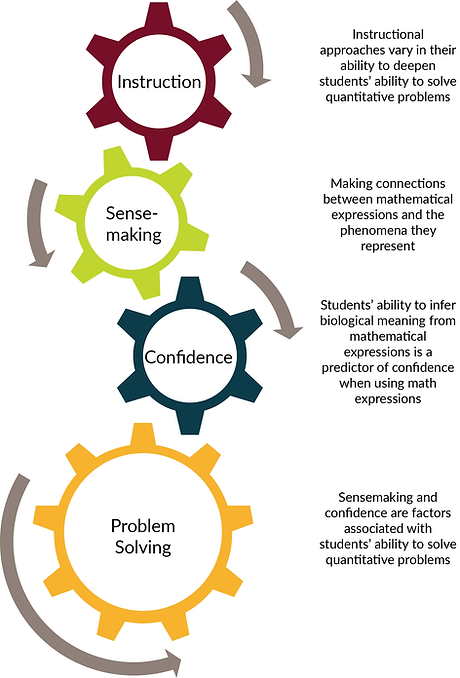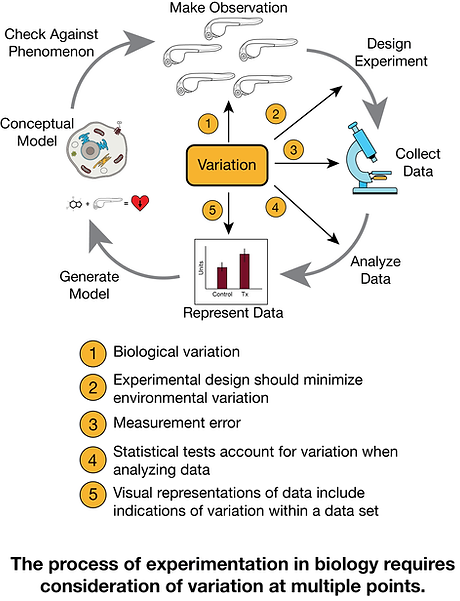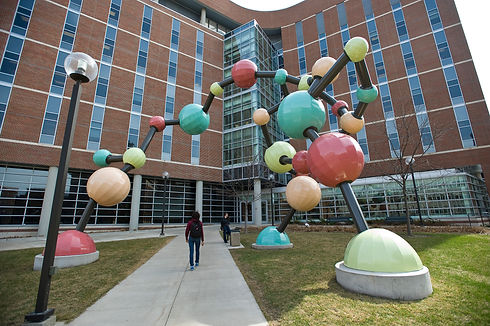RESEARCH
Our research group broadly explores how students make sense of mathematics in the context of biology, and how math can be used to understand biological phenomena

BIMODALS: BIOLOGY INTEGRATED WITH MATHEMATICS TO OPTIMIZE DEVELOPMENT OF APPROACHES TO LEARNING SENSEMAKING
The increasingly quantitative nature of biological research and medicine has sparked calls to increase instruction in quantitative biology at the introductory level. We are investigating students' ability to think quantitatively about biology from two perspectives: 1) what factors influence students' ability to solve quantitative problems, and 2) how do students perceive the purpose of mathematical expressions in biology classrooms?
We are specifically examining how students' ability to connect a mathematical expression to a physical phenomenon (sensemaking) and confidence impacts their ability to solve quantitative problems. Our results suggest that students’ sensemaking is a significant influence (either direct or mediated by confidence) on correctness when solving problems.
Biologists use mathematical expressions in a variety of ways. However, not much is known about students’ thinking on the purpose of mathematical expressions in the classroom. We are investigating students’ perceptions of the purpose of five specific mathematical expressions commonly used in biology. Our results suggest that students may benefit from instruction targeted towards purpose depending on instructional goals and the mathematical expression.

BIOVEDA: BIOLOGICAL VARIATION IN EXPERIMENTAL DESIGN AND ANALYSIS
Variation is inherent to biological investigations. However, variation is seldom the topic of explicit instruction in biology classrooms. We have developed an assessment tool to characterize students' ideas about variation in the context of biological investigations (the BioVEDA assessment), and are working to implement a curricular intervention to facilitate deeper exploration of variation at multiple stages of biological investigations.
Analysis of student responses on the BioVEDA assessment indicate that students have a better conceptual understanding of variation (e.g. identifying potential sources of variation in a biological experiment) than quantitative understanding of variation (e.g. how statistical analyses of biological data account for variation).
The curriculum that we are currently implementing features five modular activities that ask students to grapple with variation in experimental design, data collection, data representation, and data analysis. Preliminary results from implementation in a quasi-experimental design indicate that this curriculum is effective in developing students' understanding of variation in biological investigations.
Learn more about the BioVEDA curriculum by reading our CourseSource article!
COLLABORATIVE RESEARCH
HOW DOES PROFESSIONAL DEVELOPMENT IMPACT TEACHING ASSISTANTS' CLASSROOM PRACTICES?
In collaboration with Dr. Abdi Warfa's group, we are investigating ways in which professional development impacts Teaching Assistants' (TAs) practices in the classroom. The Warfa group is particularly interested in the types of talk moves TAs use to prompt students to think about content, and how different types of talk moves relate to student outcomes.


HOW DO STUDENTS PERCEIVE AND INTERACT WITH THE CULTURE OF BIOLOGICAL RESEARCH?
Our own Jess Dewey, who is co-advised by Dr. Gillian Roehrig, is working to establish a framework to describe the culture of biological research. The way in which students perceive and interact with the culture of biological research as they progress through their undergraduate experience may influence their interest and participation in biological research, and their future career trajectory.